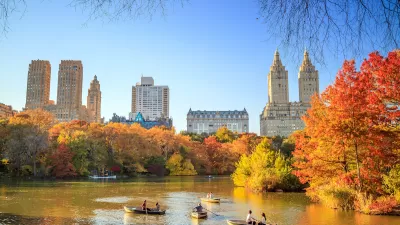An op-ed by Kerri Culhane, associate director of Two Bridges Neighborhood Council, asks "what is the Lowline, and who is it for?"
Culhane's op-ed argues against the Lowline from every possible angle. (The Lowline is a high profile, proposed repurposing of the former Delancey Street trolley terminal on the Lower East Side of New York City into a subterranean park.) Some of the op-ed's strong comments (among many):
- "As the Lowline juggernaut gains more high-profile supporters, it should strike anyone that there has never really been a meaningful community vetting of the proposed use for the MTA trolley turnaround. Two Bridges has suggested to our elected officials and the community board that the space be assessed as a potential bus terminal; but without celebrity support, our proposal has fallen on deaf ears."
- "If the $70 million estimated cost of the Lowline were spread out among our existing under-resourced local parks, the number of residents that could be served would far outstrip the number served by the Lowline."
- "The High Line has much more than the Lowline ever could—namely seasonal variety and views—but both are implicitly designed to attract real estate investment and tourists. For local small businesses and low-income residents, the High Line has been a disaster."
FULL STORY: Op/Ed: Is the Lowline a “Community-Driven Park” or a Trojan Horse?

Planetizen Federal Action Tracker
A weekly monitor of how Trump’s orders and actions are impacting planners and planning in America.

Maui's Vacation Rental Debate Turns Ugly
Verbal attacks, misinformation campaigns and fistfights plague a high-stakes debate to convert thousands of vacation rentals into long-term housing.

Restaurant Patios Were a Pandemic Win — Why Were They so Hard to Keep?
Social distancing requirements and changes in travel patterns prompted cities to pilot new uses for street and sidewalk space. Then it got complicated.

In California Battle of Housing vs. Environment, Housing Just Won
A new state law significantly limits the power of CEQA, an environmental review law that served as a powerful tool for blocking new development.

Boulder Eliminates Parking Minimums Citywide
Officials estimate the cost of building a single underground parking space at up to $100,000.

Orange County, Florida Adopts Largest US “Sprawl Repair” Code
The ‘Orange Code’ seeks to rectify decades of sprawl-inducing, car-oriented development.
Urban Design for Planners 1: Software Tools
This six-course series explores essential urban design concepts using open source software and equips planners with the tools they need to participate fully in the urban design process.
Planning for Universal Design
Learn the tools for implementing Universal Design in planning regulations.
Heyer Gruel & Associates PA
JM Goldson LLC
Custer County Colorado
City of Camden Redevelopment Agency
City of Astoria
Transportation Research & Education Center (TREC) at Portland State University
Jefferson Parish Government
Camden Redevelopment Agency
City of Claremont



























